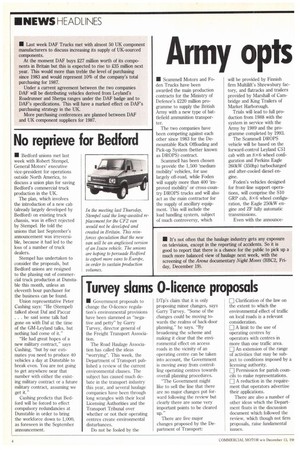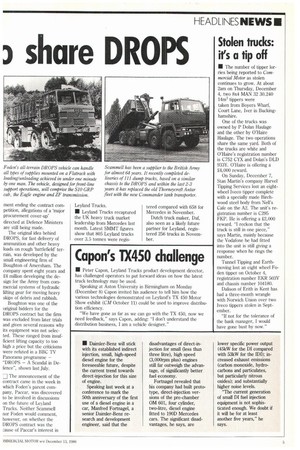Army opts ) share DROPS
Page 6

Page 7

If you've noticed an error in this article please click here to report it so we can fix it.
• Scammell Motors and Foden Trucks have been awarded the main production contracts for the Ministry of Defence's £220 million programme to supply the British Army with a new type of battlefield ammunition transporter.
The two companies have been competing against each other since 1983 for the Demountable Rack Offloading and Pick-up System (better known as DROPS) contract.
Scammell has been chosen to provide the 1,500 'medium mobility' vehicles, for use largely off-road, while Foden will supply more than 400 'improved mobility' or cross-country DROPS trucks and will also act as the main contractor for the supply of ancillary equipment. This will include the load handling system, subject of much controversy, which will be provided by Finnish firm Multilift's Shrewsbury factory, and flatracks and trailers provided by Marshall of Cambridge and King Trailers of Market Harborough.
Trials will lead to full production from 1988 with the system in service with the Army by 1989 and the programme completed by 1993.
The Scammell DROPS vehicle will be based on the forward-control Leyland C51 cab with an 8 x6 wheel configuration and Perkins Eagle 260kW (350hp) turbocharged and after-cooled diesel en
gine
Foden's vehicles designed for front-line support operations, will comprise the SIO GRP cab, 8x 6 wheel configuration, the Eagle 250kW engine and ZF fully automatic transmissions.
Even with the announce ment ending the contract competition, allegations of a 'major procurement cover-up' directed at Defence Ministers are still being made.
The original idea behind DROPS, for fast delivery of ammunition and other heavy loads on rough 'battlefield terrain, was developed by the small engineering firm of Boughton of Amersham. The company spent eight years and 24 million developing the design for the Army from commercial systems of hydraulic lifting gear for moving heavy skips of debris and rubbish.
Boughton was one of the original bidders for the DROPS contract but the firm was excluded from later trials and given several reasons why its equipment was not selected. These ranged from insufficient lifting capacity to too high a price but the criticisms were refuted in a BBC TV Panorama programme — "DROPS — A Scandal in Defence", shown last July.
II The announcement of the contract came in the week in which Foden's parent company, Paccar, was discovered to be involved in discussions on the future of Leyland Trucks. Neither Scammell nor Foden would comment, however, on whether the DROPS contract was the cause of Paccar's interest in
Leyland Trucks.
• Leyland Trucks recaptured the UK heavy truck market leadership from Mercedes last month. Latest SMMT figures show that 805 Leyland trucks over 3.5 tonnes were regis tered compared with 658 for Mercedes in November.
Dutch truck maker, Daf, also seen as a likely future partner for Leyland, registered 256 trucks in November.












































































